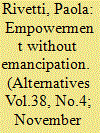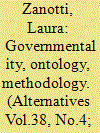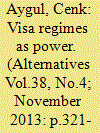| Srl | Item |
| 1 |
ID:
129485


|
|
|
|
|
| Publication |
2013.
|
| Summary/Abstract |
This article examines the centrality of political activism in the identity of Iranian refugees and investigates how they perform and incorporate it by considering the interlocked pressure of international politics, personal networks, and the assistance provided by civil society organizations. The case of Iranian political refugees in Italy and Turkey is of particular interest because of the international visibility of the Green movement, the Iranian people's historical experience of emigration, and the fact that Iran is a subject of great interest for a number of human rights nongovernmental organizations (NGOs). It shows how the process of "being a refugee" works not only through classical forms of institutional pressure but also through "unexpected" forms such as NGO efforts to empower refugees politically. Despite the positive value attached to it, in this context political activism can force refugees into preestablished roles, such as "human rights defenders" or "Green movement activists." Paradoxically, refugees act within a context that dominates them even when it tries to empower them.
|
|
|
|
|
|
|
|
|
|
|
|
|
|
|
|
| 2 |
ID:
129484


|
|
|
|
|
| Publication |
2013.
|
| Summary/Abstract |
Some critical international relations scholars have adopted theories of governmentality both as a heuristic framework for exploring modalities and functions of power and as a descriptive tool to explore the oppressive effects of global liberalism. I argue that, as a descriptive tool, much governmentality literature remains rooted in the same substantialist ontology and epistemology as the liberal discourses it seeks to criticize. This ontological orientation especially has a bearing on conceptualizations of political agency, which remain confined to the liberal struggle of power and freedom. I suggest that reimagining political agency calls for a reorganization of the ontological and epistemological framework of international relations in non-substantialist ways. The analysis maps non-substantialist positions across disciplinary lines. By treating power and subjects as deeply imbricated, non-substantialist ontologies examine political engagements as processes of hybridization aimed at producing practical effects in specific contexts.
|
|
|
|
|
|
|
|
|
|
|
|
|
|
|
|
| 3 |
ID:
129483


|
|
|
|
|
| Publication |
2013.
|
| Summary/Abstract |
The interaction of processes of state formation, liberal peacebuilding and statebuilding and localized practices of peacemaking-or what might be called peace formation-offer the prospect of forms of peace that may be both locally and internationally legitimate. Post-liberal and hybrid forms of peace influenced by local patterns of politics, based on contextual social, cultural and historical, norms, identities, and material resources, as well as cognizant of international norms, not to mention power, may represent a more accurate characterization of the results of peace processes worldwide. This article examines local processes of peace formation and emerging peace infrastructures.
|
|
|
|
|
|
|
|
|
|
|
|
|
|
|
|
| 4 |
ID:
129486


|
|
|
|
|
| Publication |
2013.
|
| Summary/Abstract |
This article examines the significance of labor mobility for capitalism and analyzes the visa regimes of the European Union (EU) and Turkey. After the fall of the Berlin Wall, labor mobility originating from Eastern Europe has been redirected to the West, taking the form of circular migrations and replacing the previous rotation system. While the new forms of circular mobility created insecure employment conditions for many people, it also required a visa regime to classify people when they arrive at the borders. Both nation-states and supranational organizations such as the EU continue to build regulatory capacities. The second half of the article examines the Schengen agreement and the ways in which French German sensitivities were "communitized." While other East European countries chose to be a part of the Schengen agreement's restrictive visa policies, this option was not possible for Turkey, which established a fully liberal regime.
|
|
|
|
|
|
|
|
|
|
|
|
|
|
|
|